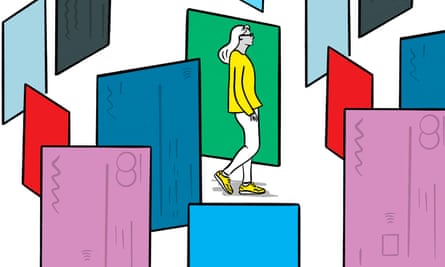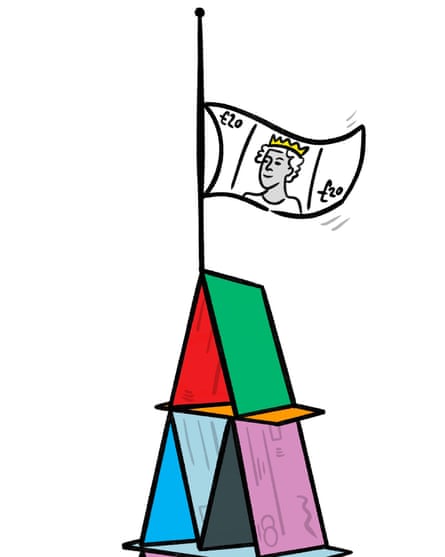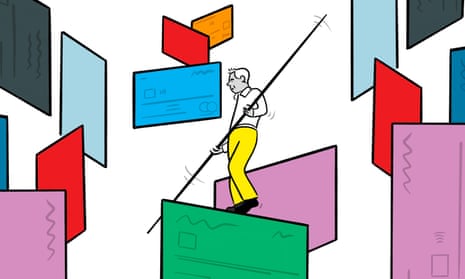It had taken so much for Tina to get to the supermarket; to go home empty-handed left her in tears. Tina, 47, has conditions including chronic fatigue syndrome, fibromyalgia, post-traumatic stress disorder, anxiety and depression. She should not have been out at all, but, although her doctor had told her to shield indoors, she had not been put on the government’s high-risk list, meaning she has to do her food shopping herself.
Tina had taken the bus from her home in Kent to her local supermarket. She had queued up outside, which is tough when you are on crutches – standing up for any period of time is fatiguing. When she got into the supermarket, she hustled around as quickly as she could and was relieved to find they had almost everything she needed. At the till, the checkout assistant scanned Tina’s items. She got out her cash. The checkout operator waved it away. “You can’t pay cash in here,” she told Tina. “It’s against the law.”
Tina knew that could not be true. “I said: ‘It’s not the law,’” Tina remembers. “‘You can only refuse a note if it’s a forgery. It’s the Queen’s legal tender!’” But the checkout operator insisted – it was a card payment or nothing. Tina told her that she could not pay by card because she did not have enough money in her account to cover the shopping. The checkout operator would not budge. “I got the bus home in tears.”
Tina is one of the many people who have struggled to purchase necessities during the coronavirus pandemic, as retailers increasingly refuse to take cash. A recent study of more than 2,000 people by the consumer group Which? found that one in 10 people were refused by shops when trying to purchase essential items with cash during the pandemic. Which? has long been calling on the government to protect cash as a payment option, with some success: the chancellor of the exchequer, Rishi Sunak, pledged to protect access to cash in his 11 March budget.
But that was before coronavirus hit and retailers moved to ban cash transactions because of concerns that coins and notes may spread Covid-19. (Contrary to reports, the World Health Organization never instructed consumers to avoid cash during the pandemic.) Within days of shops starting to close, UK cash usage halved. Signs reading “contactless payment only” became common at tills and petrol stations. “What covid did was push anyone who could go digital to go digital,” says Natalie Ceeney of the Access to Cash Review, an independent body assessing the future of Britain’s cash needs. The UK has been moving towards a cashless economy for some time, with ATM usage declining at about 6% to 10% a year. But Covid-19 supercharged this transition. “During lockdown, cash withdrawals from ATMs were down about 60%,” she says. “That’s a huge drop.”
If you have ever seen a queue outside banks or post offices to pay bills in cash, you may have seen people like Tina. As is the case for many people on benefits, low incomes or without access to online banking, Tina usually withdraws her personal independence payment and her employment and support allowance in cash. She then tops up her gas and electric at the bank, where she also pays her council tax, and puts the rest aside for food.

Those of us who use contactless payment technology routinely scarcely noticed the coronavirus-induced switch to a virtually cashless economy, apart from the limit being increased to £45. But for the approximately 1.2 million people living in the UK who are unbanked – meaning they don’t have access to any bank account – buying essentials became a herculean undertaking. “People without legal immigration status in the UK are not legally allowed to open a bank account,” says James Tullett of the migrant and refugee charity Ramfel. When shops refuse to take cash from these people, they leave them vulnerable to bad actors, Tullett adds. “They are likely to use informal services, which are more open to being exploited.”
It is not only unbanked people who will have struggled during the pandemic. People with bank accounts prefer to use cash for a variety of practical and personal reasons. “Those who rely on cash are the most vulnerable people in our society,” says Ceeney. “They may live in a rural area where they can’t get the decent broadband or mobile signal they need for online banking. Or they may be older or on low incomes.”
Domestic abuse survivors often squirrel away emergency cash – the odd fiver here and there is easy to hide. “Access to cash is really important,” says Nicola Sharp of the charity Surviving Economic Abuse, “both in terms of their ability to flee and their safety after fleeing.” She explains that many abusers monitor bank transactions, leaving survivors reliant on cash. “Measures to go cashless create a context in which it is more difficult for survivors to access the cash they need,” Sharp says.
It is a cruel irony that the people most reliant on cash during the pandemic – older people, who often need cash to reimburse neighbours for shopping – were the people most likely to struggle to access it. About 2.3 million people aged 70 or above don’t have an internet connection at home. Bank and ATM closures in rural areas – at least 3,303 have closed in the past five years – disproportionately affect older people.
Age UK received a surge of phone calls in the third week of lockdown, as older people with diminishing reserves worried about how they would reimburse neighbours and relatives for their food shopping. In response, Barclays, NatWest and Tesco Bank started sending out cash through the post. But some older people were left with no choice but to hand over their bank cards to strangers and trust them to do the right thing.
“I will not do banking on the iPad at all,” says Audrey, an 87-year-old retiree from Bedfordshire. “I just refuse to do it.” Normally, this poses no problem: it is a 15-minute walk from Audrey’s house to her local building society. But during coronavirus, Audrey – who has lived alone since her husband died eight years ago – has relied on her son to withdraw cash for her, which she gives to her neighbours for food shopping. “I put the cash in an envelope and leave it on the doorstep,” says Audrey. But she worries about older people without family to help out. “What if you don’t have a family?” she asks. “How do you get cash then?”

Consumers and retailers favour contactless payments for hygiene reasons: there is no need for customers to handle chip-and-pin machines. “Covid has been a massive win for the digital payments industry, and the digital world more generally, as people retreat from the physical,” says Brett Scott, author of The Heretic’s Guide to Global Finance.
But, as the economy switched to contactless in a matter of days, many people were left behind. Jaki Whyte, 38, from Colchester, has only a chip-and-pin debit card. This proved difficult during the pandemic, as Whyte – who is disabled and on the shielding list – relies on care workers to pick up supplies. On three occasions, White’s care workers were refused at her local pharmacy because her card was not contactless. (She is not registered for online banking because she can’t afford the data on her phone and, until the banks reopen, she is not able to request a contactless payment card.) “It took nearly two and a half months to get what I needed,” Whyte says, “and only because a family member got a lift into town to help me out.”
When Whyte ventures back into the world, she will probably find it more difficult than ever to purchase necessities. “When we emerge from covid,” says Ceeney, “our cash infrastructure will be even more unviable, and it’s likely we’ll see more bank closures. Shops need to deposit cash. If they don’t have a local bank branch where they can do that, it makes taking cash really difficult. That’s why more retailers are going to go cashless.”
Some would argue that a cashless society is the future; who are we to resist it? Surely people such as Audrey should receive digital literacy training and those who refuse should be corralled through the removal of ATMs, bank closures and card-only tills until the narrowing and more desperate cadre of digital refuseniks is finally obliterated. But there are ideological reasons to resist going cashless. “The war on cash is a bigger issue than people realise,” says Scott.
The private banking sector, and payment companies such as Visa and Mastercard, want us to stop using cash. “These guys have been battling against cash,” Scott says. “They view cash as a cost.” (By contrast, state-run banks generally try to preserve access to cash.) When we move towards a cashless society, Scott explains, we are locked into the private banking system. “Imagine you go to a casino and you have cash with you – state money,” Scott says. “The casino gives you chips, which you can cash out when you leave. A similar thing goes on in the private banking sector. Every time they close branches or cut ATMs, they’re preventing you from exiting their system. Our ability to exit the banking sector is the single greatest thing that holds banks in check,” Scott says.
The slide towards a cashless economy also raises privacy concerns. “With digital systems, there are huge amounts of data,” Scott says. “When you can see what people are buying, you can start to block payments, chaperone payments, mess with payments … financial data is one of the most sensitive forms of data around.” Moving to a digital-first system benefits the major players, something Audrey understands intuitively. “It’s all right for the big boys, for the banks,” Audrey says. “It makes their lives easy for them: no cash! But I don’t think for the small traders it will do them any good.” Retailers usually pay fees on contactless payments. She worries about how service industry workers will fare. “Suppose you go on a coach outing,” Audrey says. “Normally you put 50p into a whip-round for the guide. How would you do a whip-round if you haven’t got any cash?”

This Covid-19-accelerated move to a cashless economy will hurt the most vulnerable in our society the most. “Cash dependence mirrors classic vulnerabilities in terms of income, disability and race,” says Ceeney. People who earn less than £10,000 are 14 times more likely to be dependent on cash than those who earn more than £30,000 a year. “The reason for this is primarily budgeting,” Ceeney explains. “If you’re a gig economy worker, direct debits can be dangerous. If you have a fixed amount of money in cash, you can budget for exactly what you have.” Contactless payments, which can often take a few days to come out of accounts, can skew a precarious financial balance.
This is the reason Whyte prefers to use cash. “I can see in my hands how much, physically, I’ve got,” she explains. “I can’t budget when it’s not cash – I don’t know where I’ve spent my money. I can’t do mental maths like that.” Cash is either there or it is not – Tina also does not have to worry about a direct debit looming out of the digital ether and destabilising her finances. “I know what it’s like to go without food, gas or electric,” she says. “With cash, I know exactly how much is in my purse.”
For Tina, having to switch to digital payments during the pandemic has been stressful. She recently got out of debt with the help of the charity Christians Against Poverty. Having to set up card payments during the pandemic – she could not pay for her gas or electricity at the bank – caused her mental health to deteriorate. Her daughter helped, but still Tina worries. “What if I’ve done something wrong and the bill hasn’t been paid?” Tina says. “It’s made my anxiety worse.”
What are the long-term implications of starving a nation of its access to cash? More anxiety for Tina. Increased exploitation of unbanked people. Fewer options for women fleeing abusive relationships. People who beg and charities that rely on cash donations disadvantaged. A public locked into a private banking system from which we have no escape and increasingly less autonomy. “If we go to a cashless society, I won’t be able to cope,” Tina says.
“Cash is really the bicycle of payments,” says Scott. “It preceded the car and is still popular today. We need to have a multimodal form of payment systems … cash and card working together, just as bicycles and car lanes go together.” Because, although cash may be a pain to carry around sometimes, it is actually pretty useful.
Some surnames have been omitted to protect identities
